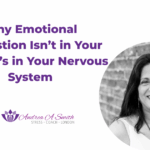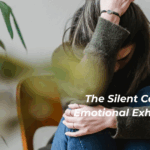Anxiety and chest pain are often connected, resulting in increased fear and uneasiness. It may be uncertain whether you are suffering from a heart attack or a panic attack. You ask yourself, Am I having a heart attack or panic attack?’
Do you want to know the difference between a heart attack and panic attack? In this post, you will see that the symptoms of panic attacks and heart attacks are similar, like chest pain, dizziness, sweating, breathlessness and trembling.
So are you suffering from a heart attack or a panic attack?
Most individuals suffering from panic attacks say their acute anxiety feels like a heart attack. That’s because the signs and symptoms can feel the same. Both symptoms make you feel as if something bad is going to happen, you are losing control and there are feelings of unreality.
The most intense is the feeling of fear that dominates both situations. You see, the fear itself can increase such symptoms.
Learning the Difference:
You must call 911 if you are suffering from symptoms like a heart attack. You will find ways to identify the difference between a heart attack or a panic attack. However, medical intervention is the only efficient way to be specific. Here are the symptoms you need to pay attention to:
- Chest pain with sweating and numbness of hands and feet
- vomiting
- discomfort between the blades and shoulder
- problems that travel into your jaw area
- aching or shooting pain that moves down your arm
- burning oesophagal discomfort resembling indigestion
Those symptoms can signal a heart attack. It will help if you are aware of your heart attack risk factors. For instance, are you a smoker with a family history of high blood pressure or heart disease? Then you are more likely to encounter a heart attack.
Meanwhile, are you suffering from chronic stress or encountered a traumatic event? Maybe you are dealing with anxiety dealing with daily life’s challenges that are causing you significant discomfort due to your situation. If That’s the case, then you are suffering from anxiety.
Signs of severe panic and anxiety often look and feel like a heart attack. That can exacerbate your suffering. The pain can be a bit overpowering, especially if anxiety feels like a heart attack. Luckily, when stressors reduce, the symptoms usually do, as well.
What is the Connection Between Heart Attack and Panic Attack?
Most mental health problems can influence your heart health. When your body is under massive stress, it generates a higher cortisol level, adrenaline, and glucose. Prolonged or too much stress can pressure your arteries, heart, and adrenaline glands to overwork, causing physical issues.
Further, unhealthy coping mechanisms such as eating fatty foods and smoking cigarettes can contribute to poor health. It can also lead to an unhealthy mental state, becoming a significant risk factor for a heart attack.
Research suggests that if you have been struggling with a panic disorder, there is a high risk of you suffering from a heart attack, but the studies are not definitive. Being mindful of your health and getting treatment for panic and anxiety attacks, reducing the risk factors like improving your diet and exercise can reduce the likelihood of developing heart disorders.
Did you know that approximately a third of all heart attack survivors suffer from depression? Can anxiety cause chest pain? Yes. Chest pain and stress can trigger more panic, leading to a destructive cycle. Healthy physical and mental habits can lessen the possibility of heart attacks and for you to be more in control of your anxiety and panic attacks.
Stop Your Panic Attacks Today
The ideal way to prevent panic attacks is to understand how to control them. Remember that panic attacks aren’t heart attacks. Forewarned is forearmed. Learn how to avoid anxiety and panic attacks. The more you know, the less likely you are to experience these attacks.
If you can manage your panic attacks in the future and learn about your triggers and coping techniques to handle such problems, you can live a healthier and happier life.
If you want to learn more about stopping anxiety attacks, Please contact me now.










